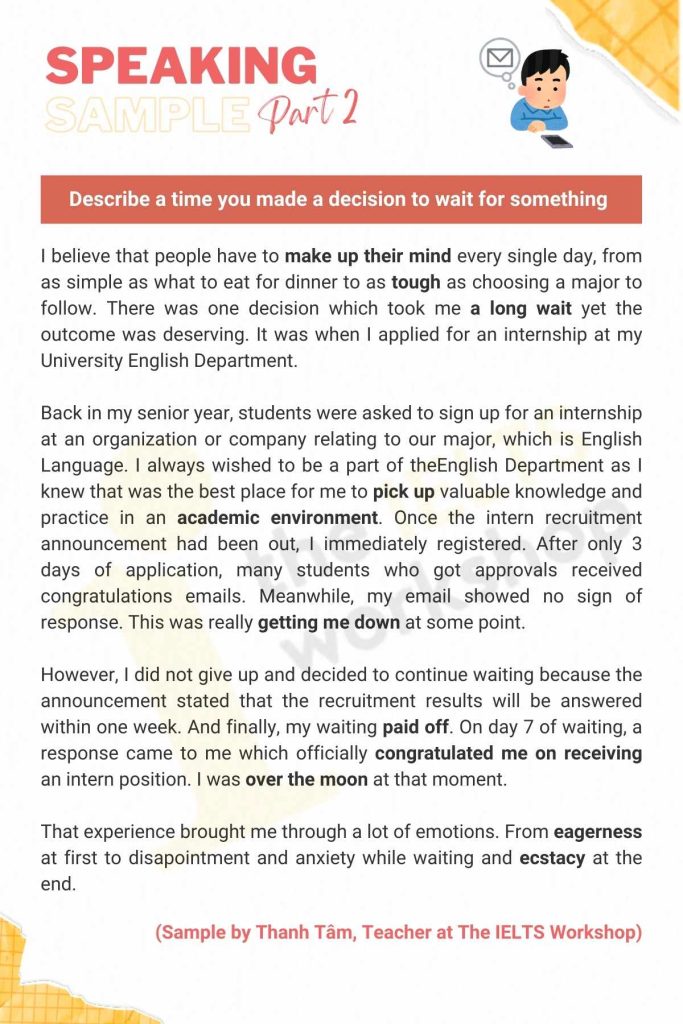Trong chuyên mục giải đề IELTS Speaking kỳ này, cùng tham khảo chủ đề: “Describe a time you made a decision to wait for something” qua bài mẫu của cô Thanh Tâm của The IELTS Workshop dưới đây nhé.
Part 2: Describe a time you made a decision to wait for something
Describe a time you made a decision to wait for something
You should say:
When it happened
What you waited for
Why you made the decision
And explain how you felt while waiting
Dưới đây là bài mẫu cho topic “Describe a time you made a decision to wait for something”.
1. Bài mẫu (Sample)

2. Từ vựng (Vocabulary)
- make up one’s mind: đưa ra quyết định
- tough decision: quyết định khó khăn
- a long wait: sự chờ đợi lâu dài
- pick up: học hỏi
- academic environment: môi trường học thuật
- get sb down: làm ai thất vọng
- paid off: được đền đáp, thành công
- congratulate sb on doing sth: chúc mừng ai về cái gì
- be over the moon: vui sướng
- eagerness: sự háo hức
- ecstacy: sự hạnh phúc
Part 3
What do people in your country often do while waiting?
Why do some people like a slow-paced life?
Is being patient good for people? Why?
Are people less patient now than people in the past? Why?
Why do children lack patience?
How can people become more patient?
1. What do people in your country often do while waiting?
Well, there are various activities that a person can do to kill time and I think it primarily depends on generations. On the one hand, the elderly usually make use of newspapers and magazines at public places or bring some books along so the waiting time will not be a waste. On the other hand, youngsters are inclined to socialize so having a conversation or taking part in team-work games might be ideal for them.
- kill time: giết thời gian
- make use of: tận dụng
- bring sth along: mang theo
- be inclined to: có thiên hướng
- socialize: nói chuyện
2. Why do some people like a slow-paced life?
Slow living offers various merits including promoting a healthier life, having time to improve relationships and relax. A materialistic and industrial lifestyle might put people at a fast-paced life when everything must be done as quickly as possible and people are always on the move. Hence, a slow-paced life tends to be a remedy, slowing down for having a deep look at every aspect of life, self-healing and developing valuable experience.
- slow living: sống chậm
- materialistic and industrial lifestyle: lối sống vật chất và công nghiệp
- a fast-paced life: cuộc sống nhanh
- be on the move: di chuyển
- remedy: giải pháp
- self-healing: tự chữa lành
3. Is being patient good for people? Why?
To some point, yes. Many things in life do not come immediately as a person might wish yet they require endurance and waiting. In addition, it is the foundation of our mental stability when encountering difficulties. A patient individual might be more likely to overcome challenges and succeed. Yet, it is also important to bear in mind that passivity is a negative outcome of too much patience too.
- endurance: sự bền bỉ
- mental stability: sự ổn định về tinh thần
- bear in mind: ghi nhớ
- passivity: sự thụ động
4. Are people less patient now than people in the past? Why?
This might be true for several reasons. Current life is considered to happen at a fast pace and people are also caught up in that flow. Their decisions sometimes must come quickly or else they will lose their opportunities. However, people nowadays appear to be more resilient and patient especially when facing difficulties. They accept to be under stress and work diligently to achieve their goals.
- be caught up in: bị cuốn vào
- work diligently: nỗ lực làm việc
5. Why do children lack patience?
Well it is understandable as cognitive development is a life-long process. At a young age, children are still learning to regulate their emotions via observing, taking part in activities and socializing with adults and their peers. Furthermore, being patient is usually in great demand when encountering challenges. However, children’s lack of experience and incomplete problem-solving skills make them become less patient to handle such difficult tasks.
- cognitive development: sự phát triển nhận thức
- life-long process: quá trình kéo dài cả đời người
- regulate: kiểm soát
- be in great demand: đòi hỏi nhiều
6. How can people become more patient?
It is highly recommended that people start with breathing exercises. By deeply feeling their breath, people might release negative emotions such as stress and embrace positive feelings. Another way to practice patience is showing gratitude. For example, writing down 10 things that you are grateful for before going to bed as a daily must-do task might work well.
- breathing exercise: tập thở
- show gratitude: thể hiện lòng biết ơn
Bài mẫu bởi cô Thanh Tâm – Giáo viên The IELTS Workshop HCM
Xem thêm: Describe an occasion when you waited a long time for a nice thing | IELTS Speaking Part 2 + 3
Trên đây là bài mẫu cho topic: Describe a time you made a decision to wait for something. Các bạn có thể tham khảo các bài mẫu IELTS Speaking Part 2 khác của The IELTS Workshop tại đây!
Ngoài ra, khoá học Senior của The IELTS Workshop sẽ giúp bạn nâng cao kỹ năng cũng như xây dựng chiến lược trả lời câu hỏi, tham khảo ngay nhé!!









